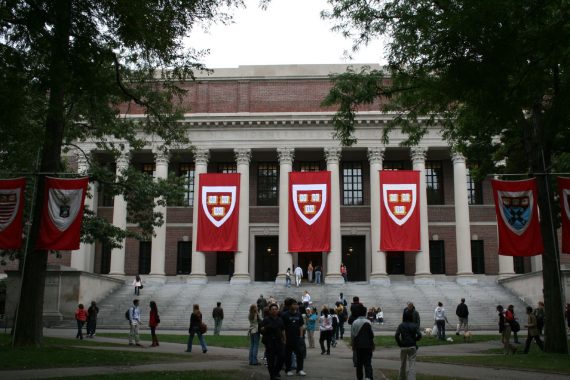Why is Harvard Subsidized by the Taxpayer?
A wealthy alumnus has given Harvard $400 million, sparking a heated debate.
A wealthy alumnus has given Harvard $400 million, the largest donation in its history. It’s endowment now tops $36 billion–$10 billion more than any other university. Indeed, the $400 million donation alone far surpasses the average total endowment of our nation’s universities.
Naturally, people are coming out of the woodwork questioning the wisdom and morality of this use of money. While I tend to agree it is, at the end of the day, John Paulson’s business what he does with money he earned legally. And, while Harvard doesn’t need the money, it does use the earnings on its investments to fund research, provide scholarships, and other things that are socially worthwhile.
What does strike me as legitimate fodder for public debate is the fact that these donations are heavily subsidized by the taxpayer:
Dean Zerbe, a tax lawyer and former senior counselor for the Senate Finance Committee from 2001 to 2008, estimates that Paulson will receive a nearly $200 million tax deduction due to his donation. Zerbe worked with Republican Senator Chuck Grassley in 2008 in a failed attempt to require that universities spend a certain amount of their endowments (most wealthy universities cap endowment spending at about 4 percent of annual returns).
Donations to universities, the returns on their endowments and their property holdings are not taxed, as colleges are considered nonprofits. This tax-exempt status has, at times, been a controversial one. Billions of dollars of investment returns and donations go untaxed each year at wealthy universities like Harvard. Zerbe believes that more and more lawmakers are becoming frustrated by such tax advantages for wealthy universities.
“Congress is just slack-jawed people are giving huge amounts of money to institutions that have more money, and don’t even know what to do with the money they’ve got,” he said. “Is this more frosting on a cupcake that’s already got seven layers of frosting on it, or what?”
Cunningham says that, in her experience, donors aren’t motivated by tax breaks. Yet such tax incentives impact the bottom line for American taxpayers, and some wonder if such benefits should exist for donors who choose to give to the wealthiest institutions in U.S. higher education.
“It’s great if a wealthy individual wants to donate $400 million to an institution like Harvard, but the problem is that the rest of us support that gift — and subsequent earning on it — through generous tax breaks,” said Richard Kahlenberg, a senior fellow at the Century Foundation, in an email.
While Harvard and universities like it usually offer large amounts of financial aid to middle- and low-income students, they generally enroll fewer low-income students than regional colleges and community colleges with less wealth. In 2012-13, for example, 19 percent of students at Harvard were eligible for Pell Grants, a type of federal aid only available to low-income students. Yet 36 percent of undergraduates in the U.S. received Pell Grants that year.
Conversely, Harvard enrolls many more wealthy students than most universities, and their graduates generally have better employment and earning outcomes than most U.S. college graduates, although critics say that these students likely have qualities — academic, and for many, socioeconomic — that make them likely to succeed wherever they go to college.
While the issue doesn’t get a lot of attention, we’re thus seeing those on the right (Grassley) and the left (Century Foundation) raising concerns that subsidizing these donations through the tax code is problematic. In essence, Paulson’s $400 million donation only costs him $200 million, with the rest of us footing the rest of the bill in foregone tax revenues. Given the rather dubious return on investment, it’s not at all obvious why we should be doing that.
Harvard’s a special case in that it’s far and away the university with the largest endowment. As Inside Higher Ed ’s Kellie Woodhouse notes in the linked piece, “It’s part of a prestigious pack of 10 rich universities that hold more one-third of all the wealth in higher education.” Indeed, the top 40 schools “hold two-thirds of all the wealth among the 500 colleges rated by Moody’s, which rates institutions that are financially sound enough to trade in public markets.” But these questions apply not only to other massive-endowment universities but the entire nonprofit sector.
Most Americans make too little income to itemize their taxes, much less have the means to donate substantial money to charity. Essentially, then, we’re ceding to the very wealthy the power to decide which institutions and causes get massive taxpayer grants. It would make far more sense, in this case, to devote an additional $200 million into Pell Grants, the National Institutes for Health, the National Science Foundation or some other educational or research endeavor than giving Harvard more money that it won’t spend. Instead, we automatically match Paulson’s donation to Harvard without even debating it.
Nonprofits spend the overwhelming amount of their income on salaries, overhead, and other expenses unrelated to their core mission. With the possible exception of a relative handful of pure charities, most of them have only tangential public service value, instead supporting an agenda of the funders’ choosing. It’s not obvious why they’re not taxed, much less why donations to them are tax deductible.







Agreed.
Based on some of the weird, bizarre, and outrageous activities that are allowed there, I do not want one thin dime of my money going there.
The rich have a tendency to use “charity” for self-aggrandizement: support for symphony orchestras and ballets and universities, all of which offer the donator the opportunity to swan around various galas and balls and be fêted by “society”, or even have a building named for them. Charity as ego stroke, the charity of exhibitionism.
This donation helps no one and accomplishes nothing – except to screw middle class taxpayers and make Mr. Paulson feel warm and toasty inside. It’s an empty gesture from a man who apparently could think of nothing better to do with 400 million dollars.
It’s absolutely his right, just as it’s my right to conclude that Mr. Paulson is a jerk.
But when thou doest alms, let not thy left hand know what thy right hand doeth:That thine alms may be in secret: and thy Father which seeth in secret himself shall reward thee openly. – Matthew 6: 3 and 4.
See? Even Jesus wouldn’t like this guy.
Don’t worry, after Larry Summers gets done “investing” it, it won’t be anywhere near $400 million any more.
Isn’t John Paulson the guy who fought tooth-and-nail to keep the carried Interest lower tax rate because paying real income tax rates would have been “onerous” for him? Basically, he’s screwed the taxpayer twice.
In 2008 while testifying before US House Committee on Oversight and Government Reform Paulson was asked about the low tax rate on long-term capital gains and carried interest earnings and Paulson replied “I believe our tax situation is fair.”[
Every nonprofit I’ve ever been associated with had to be careful not to accumulate too many assets, because that would trigger some kind of status change. Any of you know the details about how that works? Presumably $40B in assets puts you into whatever the top bracket is…
Harvard can donate billions to itself every year without touching their principal. They could give full scholarship to every student and pay every faculty member twice their current salary and continuously replace their existing facilities with newer ones — and still run forever without ever taking in another dime of tuition or donations. I think it’s time to congratulate them for winning the game, then push them out of the nest.
As the old saying, Harvard is a hedge fund that keeps a university.
@edmondo: Paulson was the main subject of 1 book, “The Greatest Trade Ever”, and a major part of Michael Lewis’ book “The Big Short”.
He profited massively off the misfortunes of millions of American homeowners thru Credit Default Swaps in ’08 to the tune of $4,000,000,000. And no, that is not a typo, 4 billion dollars. Not even Ayn Rand could make a hero out of that scum sucker.
Oh, and don’t bother reading tGTE, and just read “The Big Short” if you’re really interested in the subject.
To be fair, he was one of the only people who saw what was happening. And the people he made the money off of were the idiots who thought CDS’s were a free money machine. Short sellers are despised but they are very necessary to keep bubbles from getting even worse than they already are. So think of him as the financial system’s anus: unpleasant but necessary.
Returning to the subject at hand, this one of the reasons I think a flat tax might not be a bad idea, even if it means getting rid of the charity tax deduction. Most Americans don’t itemize and they still give a lot. Alternatively, you could scale the deduction by the size of the non-profit. So donating to some poor community college is 100% deductible. Donating to a middling liberal arts college is 70% deductible. And donating to Harvard is 0% deductible.
“It would make far more sense, in this case, to devote an additional $200 million into Pell Grants, the National Institutes for Health, the National Science Foundation or some other educational or research endeavor than giving Harvard more money that it won’t spend.”
Look around the country. See how Governors Jindal, Walker, and Brownback treat their state university systems. Look at Walker’s attempt, abandoned after it become public, to define the University of Wisconsin as a trade school. Look at my own state of Michigan, where the Republican dominated state government now provides less than 20% of the University of Michigan’s operating budget. Look at the University of Virginia, which faces the same problem. And look at the effect of these budget cuts on tuition rates, and how this affects the efforts of low income kids to get a higher education.
As it happens, I agree with Joyner’s call for more federal expenditures on higher education. But I see stuff like the passage I quoted above, and I wonder, once again, why somebody like James Joyner supports the Republican party.
@Stan: Yes and let’s not forget the huge power, influence, and control that Harvard has on this country: government, law (including the Supreme Court),
economics, banking, and foreign affairs. This is inordinate and inappropriate. No one school should have that monopolistic kind of control.
The argument that taxpayers are subsidizing this donation depends on a pretty aggressive definition of tax subsidy. On the one hand, if Congress enacts a $10,000 income tax credit for taxpayers who use the commenting pseudonym alkali, that’s very clearly a tax subsidy, and not any different than if Congress wrote me a check. But the fact that Congress didn’t enact a $100 taco tax does not mean that the government subsidized my lunch at Chipotle to the tune of $300. The charitable deduction is somewhere between those extremes, but it strikes me as pretty deeply embedded in the macro structure of the tax code.
The problem here isn’t really that someone gave $400m to higher education. One can certainly imagine that money going to good use at a college or university. Rather, the problem is that Harvard is not making good use of its resources, which is a non-profit governance question and not a question of tax policy. The tax code may or may not be a useful vehicle for addressing those governance issues.
@alkali: I don’t dispute that the charitable deduction is “pretty deeply embedded in the macro structure of the tax code.” So is the mortgage interest deduction. Both disproportionately—which is to say, effectively only—benefit the very well off. There’s not much of a chance of reversing either subsidy but we really ought consider it strongly.
@Hal_10000:
Sorry, I can’t be fair, just not in me. Every time I hear a conservative talk about a “job creator”, I think of Paulson. The SOB profited off the destruction of millions of jobs. He may well be necessary in the system we have now, but just saying so does not convince me that this is the system we need.
You might as well bitch about why hospitals who only donate 1% of their services should be able to call themselves non-profits as well.
You want to qualify that some more? Most nonprofits are small, struggling organizations, particularly community based organizations whose mission is to address the needs of poorer communities. Very few are large, wealthy enterprises. And what they spend on salaries (outside of administrative salaries) is spending on their core mission. Who do you think is carrying out the core mission, if not the people the nonprofit is paying?
@Monala: I’m thinking mostly of the DC-based 501c3’s. Regardless, it’s not obvious to me why churches and other agenda-driven organizations should be taxed differently than other businesses.